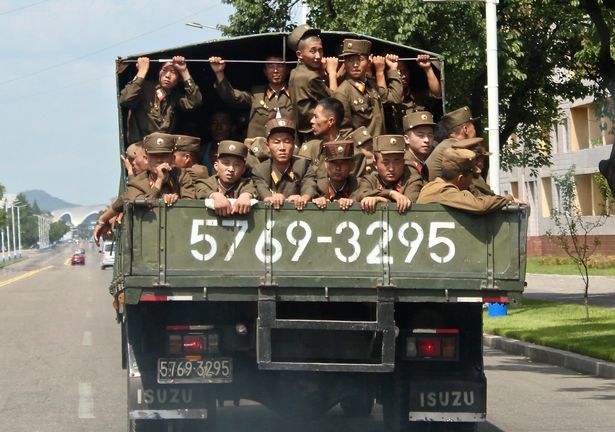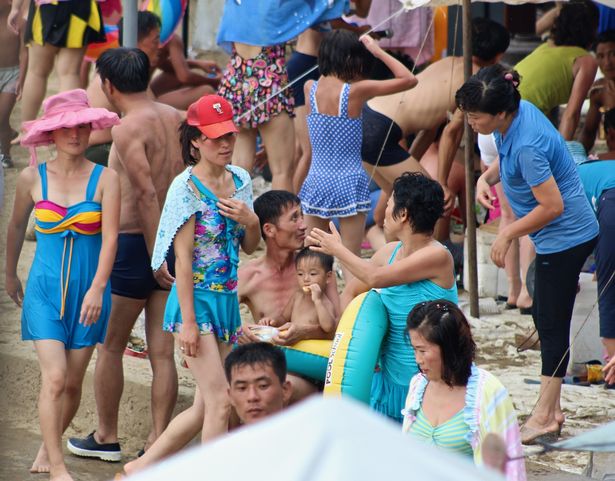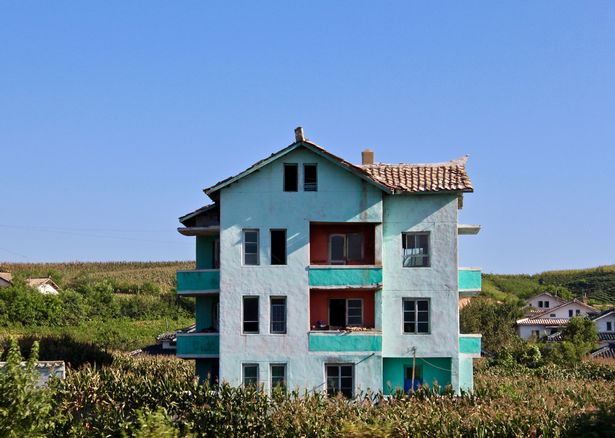‘I lived in North Korea’s secretive world – I was followed, filmed and banned from buses’ – World News
Enjoying dinner with a friend at an empty restaurant in Pyongyang, Lindsey Miller was surprised by a loud ringtone that suddenly blared from a plant pot.
Running her hand underneath the flowers on the windowsill, she discovered a blue mobile phone – before an embarrassed waitress hurried over and picked it up.
“She went back to polishing glasses as if nothing had happened,” explains Lindsey.
“It didn’t matter if some measures to keep an eye on foreigners came across as hapless. What mattered was that we felt watched and under control.”
It was an unnerving reminder of the realities of life as a foreigner living in North Korea, famously the most secretive nation in the world under the rule of despotic dictator Kim Jong-un.
Accompanying her husband on a diplomatic posting to the British Embassy in the capital Pyongyang, Lindsey is one of only a handful of Westerners to have experienced life first-hand in the shadowy hermit state.

(Image: Lindsey Miller)
In her new photo book, North Korea: Like Nowhere Else, she paints a vivid picture of communities kept under the close grip of police surveillance, while also unravelling some of the wider misconceptions about North Korean society.
Lonely and kept at arms’ length by locals fearful of foreigners, she found herself at the epicentre of a dangerous war of words between Kim and former US president Donald Trump – even becoming deceived by the warped propaganda that lined every street corner.
Spied on by men in black suits
A musical director and award-winning composer now living back in the UK, Lindsey and her husband were posted in North Korea in 2017.
Like any well-read visitor, she arrived in the midst of a hot, muggy summer with her own preconceptions.
“I knew that a pervasive cult of personality subsisted on air-lifted lobster and caviar, while most of the population was condemned to beggary and misery,” she writes.
“I’d seen the footage of goose-stepping soldiers, Cold War-style military parades, ballistic missile and nuclear tests, and the almost comedic, profound yet ultimately inconsequential, other-worldliness of the place.”
Settling down in the capital’s Munsu Dong district, where a tiny collection of foreigners reside, Lindsey was greeted by roadside outposts manned by armed guards and had a “constant feeling of being watched”.
While free to walk and drive around the city, tight restrictions are put on Westerners – they have to be accompanied by authorised personnel on the Metro and in taxis, while buses are off-limits.

(Image: Lindsey Miller)
Lindsey also struggled to find reliable internet connection and couldn’t call the outside world from her North Korean phone.
More unsettling, however, was the constant attention from locals who would openly film her on their phones and take pictures.
On one occasion, she describes being followed by two men in black suits at the height of the country’s famously harsh winter, watching in disbelief as they struggled for balance on the icy ground.
“I let it get to me too often,” she says. “But as suffocating as it sometimes felt, some instances were so ridiculous they simply made me laugh.”
Shunned by locals terrified of guards
The hardest part of everyday life for Lindsey, though, was struggling to make friends with North Korean residents.
During her stay, she attended the famously dramatic military parades, joined running events and visited a plethora of restaurants and bars – many of which oddly double up as hairdressers, gyms and karaoke rooms.
Talking to interpreters, drivers, waiters and cleaners who worked around the city, she found many were fearful of their conversations being misinterpreted by watching eyes – often ignoring or outright rejecting her.
One of Lindsey’s closest pals was a young girl called Min Jeong, an unusually outspoken worker at a local bar, the Myohyang Beer House. But even then, the limits of their relationship became clear over time.

(Image: Lindsey Miller)
“Min Jeong was always unexpectedly candid about how bored or fed up she was,how tired she was of being set up on dates by her parents or being told by her friends that she had to lose weight,” says Lindsey.
“She even went so far as to complain to me about some of the restrictions she endured. When I ran in the Pyongyang 10K she came to cheer me on, but at a distance from our mutual foreign friends.
“When I asked her why she didn’t let them know she was there, she just looked at me, widened her eyes and shook her head. ‘I couldn’t,’ she whispered. ‘Too much security. Didn’t you see all the security?”
Over time, the isolation began to overwhelm Lindsey.
She became fearful that those who did try to befriend her had ulterior motives, such as three train conductors who shared noodles with her, only to smuggle packages in her bag to avoid customs.
“How much could I really trust these people?” she says. “This question would haunt me for the entire time I was there.
“I struggled to separate the human being in front of me from their environment.”
‘I was lured in by twisted propaganda’
As the months wore on, Lindsey also found herself subconsciously taken in by the red and yellow propaganda posters draped across buildings all over the city.
Huge portraits of Kim’s family, which alarmed her upon her arrival, faded into insignificance – but as they did so, it became easy to get swept up by government messages glorifying Kim’s achievements and railing against foreign superpowers.
“I would rationalise to myself the twisted behaviour of the system and somehow find myself buying into North Korea’s claims of victimisation by the West,” Lindsey admits.
“I’d read translated statements by North Korean state media and think to myself that it was perfectly understandable that they wanted nuclear weapons.
“Why wouldn’t they when all they wanted to do was to protect themselves?”

(Image: Lindsey Miller)
While she soon separated herself from such thoughts, she also found her preconceptions about North Koreans were also wide of the mark.
Fellow foreigners eager to tantalise locals with stories about Facebook, Amazon or other details of Western society quickly realised they not only knew about such things, but were far from in awe of them.
“Foreigners often failed to realise that the Koreans we were speaking to undoubtedly already knew the information we were so eager to impart and had probably been ideologically armoured against it, or at least were numb as to why they should care,” she says.
“Min Jeong told me once that she was fed up with hearing about Facebook and told one man to shut up when he kept going on about the free internet.”
Terrified of all-out war with West
Tensions with the West nonetheless cast a dark shadow over Lindsey’s stay.
She recalls one day in September 2017 being jolted awake by the sound of a ballistic missile being tested overheard, flying over 2,000 miles from a site near Pyongyang airport.
As Donald Trump ramped up his war of words with Kim, the threat of conflict between the US and North Korea became an increasing concern for terrified residents – who knew they would be unable to flee.
“A Korean friend told me they were worried about war breaking out,” says Lindsey. “They looked at me expectantly, willing me to say something in response.
“Ordinarily, I would have insisted that the US didn’t see North Korea as an enemy. I’d try and explain that it was their own propaganda exaggerating international responses to their own state’s reckless behaviour – but it was becoming increasingly difficult to do that, given what was coming out of the White House.”
However, against all odds, tensions began to cool. Trump and Kim adopted a more diplomatic approach, later culminating in the former president’s landmark 2019 visit to North Korea, which saw the two leaders even shake hands.
As the hermit state was tentatively welcomed back into the international fold – even competing alongside its bitter southern enemy at the 2018 Winter Olympics – the streets of Pyongyang underwent a face lift.

“Propaganda slogans around the city, which had for decades encouraged the nation’s defiance against imperialist enemies, were replaced with more neutral expressions of ‘togetherness’ and musings on socialist construction,” says Lindsey.
“Propaganda posters depicting American soldiers defeated by North Korean weapons and the US Capitol being destroyed by North Korea’s iron fist were gradually replaced with imagery of scientists, students and workers leading the country towards a better future.
“With the odd exception, state media dialled down its aggressive language. Shops stocking postcards and stamps for tourists suddenly ran out of the angry, anti-American designs, to be replaced by benign pictures of farms, fishing and factories.”
‘I knew I’d never see my friends again’
When it finally came time to leave in 2019, Lindsey was overcome by a strange grief.
Having failed to break down the walls of distrust with North Koreans, she nonetheless felt a sadness that the friends she had made would have to be cut out of her life completely. Here, there was no opportunity to stay in touch on Facebook, or invite them over to the UK for a holiday.
“Even after two years of friendship, I couldn’t break the wall,” Lindsey says of those she met. “They still couldn’t give the answers it felt like they wanted to give. I had tried to understand this country and desperately failed.
“But more than anything, the grief and definiteness of leaving behind the Koreans I cared about was the most painful part. I knew I would never see or hear from them again.”
North Korea: Like Nowhere Else by Lindsey Miller, published by September Publishing, is out now.


